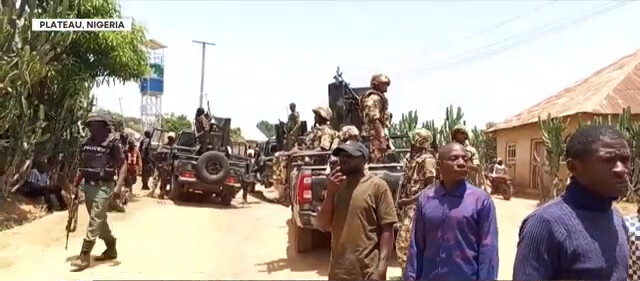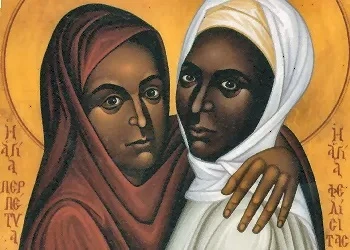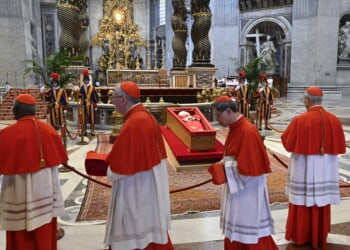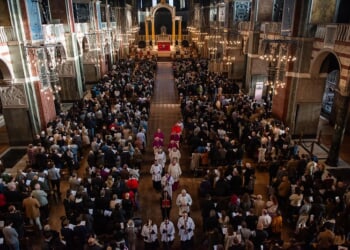My friend Nina Shea at the Hudson Institute is perhaps the most informed and passionately articulate American voice on behalf of Christians suffering persecution around the world. This morning, she brought my attention to the latest wave of attacks being launched on Christian farmers in the plateau states of Nigeria. The attackers are heavily armed Muslims from the Fulani tribe, which, in recent years, has perpetrated wave after wave of assaults upon their Christian neighbors. (RELATED: Nigeria: The Most Dangerous Place To Be a Christian)
Nina’s message cites a “developing story” report direct from Nigeria by journalist Douglas Burton from TruthNigeria.com. According to Burton, there have been more than 100 civilian casualties in an attack that is still in progress, with more than 500 heavily armed Fulani terrorists sweeping into the Ukum area in Benue State, opposed only by a handful, perhaps a hundred, Nigerian army personnel.
The marvel in this situation is that the army is there at all — over the last several years, the Nigerian military has been conspicuous by its absence whenever Christian farmers have been attacked.
For the deteriorating situation for Christians in Nigeria, I can do no better than commend to The American Spectator readers another TruthNigeria.com report from two days ago, “Fulani Ethnic Militias Converge in Benue to Threaten Ethnic Cleansing.” It makes for horrific reading.
While the Christian communities have suffered grievously for years, this report catalogs a surge of attacks since January, with a further spike since the beginning of April. It describes attacks in which the Muslim terrorists, armed with RPGs and AK automatic rifles, stormed into Christian villages riding motorcycles, spraying death and destruction in every direction.
The article further documents the links between these Fulani gangs and Jihadist elements such as Boko Haram and ISIS. It calls out the repeated failures of the Nigerian government to provide anything more than token protection for the Christians. It also condemns forthrightly the ongoing indifference of the international community.
Heartbreakingly, we also learn that the Christian communities have rendered themselves defenseless. For some time, Christian volunteers had managed to arm themselves with rifles and shotguns in order to defend their homes and families, but last October, as part of a laudable but misguided plea for disarmament from a local Catholic bishop, many of these citizen guards gave up their arms. It’s the same, age-old story — good people are persuaded, in a spirit of goodwill, to give up their means of self-defense, while the bad guys never disarm.
This aspect of the story hits me particularly hard. The second essay I ever wrote for The American Spectator, nearly two years ago, called attention to the vulnerability of these Christian communities and suggested that, absent any other form of protection, they should be encouraged to arm themselves. Since then, I’ve returned to the topic on multiple occasions, noting that our own State Department has repeatedly ignored the obvious ethnic cleansing aspect of these Muslim attacks on Christian communities and our apparent unwillingness to address a crisis that extends across the continent.
Recently, there have been encouraging signs. Led by Congressman Chris Smith, the chair of the House Foreign Affairs subcommittee on Africa, the House Foreign Affairs Committee called upon the Trump administration to redesignate Nigeria as a “country of particular concern.” Back in 2020, the first Trump administration had levied this stricture on Nigeria for its failure to protect its Christians, but the following year, the Biden administration lifted the designation, without meaningful explanation or justification.
Given Secretary of State Marco Rubio’s well-known interest in human rights issues — that is, genuine human rights issues, not the made-up variety from the last four years — one hopes that such a designation will come soon, and that it will be followed by energetic diplomatic action. Even in the midst of issues ranging from Ukraine to Iran to Taiwan, surely we have the bandwidth to take up the cause of Christian communities under brutal attack.
Sadly, diplomatic pressure takes time, and there seems to be no realistic options for providing immediate protection to these communities. In my forthcoming novel, I posit measures to train and arm them to protect themselves, but that is just fiction, wishful thinking on my part; in the real world, it is inhibited by all manner of barriers. The crisis is right now, happening as I write these words, and I see no realistic hope of, in the famous phrase of Winston Churchill, “action this day.”
I’m writing these words on Good Friday morning, reminded on this most evocative weekend of the power of faith and, with it, the power of prayer. So, please, everyone, take time from your devotions this weekend to log on to TruthNigeria.org and inform yourselves about the crisis, and then, please, pray that somehow, someway, these suffering Christians may find succor. Come Monday, however, remember what you’ve read, and call upon your representatives, making your voice heard on these poor people’s behalf.
READ MORE from James H. McGee:
Matthew Parris is Wrong: America Is Much More Than Just a ‘Moral Idea’
Rough Men, Strong Women: The 1923 Finale
‘Broken Windows’ and the Terrorism of Small Things
James H. McGee retired in 2018 after nearly four decades as a national security and counter-terrorism professional, working primarily in the nuclear security field. Since retiring, he’s begun a second career as a thriller writer. His recent novel, Letter of Reprisal, tells the tale of a desperate mission to destroy a Chinese bioweapon facility hidden in the heart of the central African conflict region. A soon-to-be-published sequel finds the Reprisal team fighting against terrorists who’ve infiltrated our southern border in a conspiracy that ranges across the globe. You can find Letter of Reprisal on Amazon in both Kindle and paperback editions, and on Kindle Unlimited.


![NYC Tourist Helicopter Falls into Hudson River, Siemens Executive and Family Among Those Killed [WATCH]](https://www.right2024.com/wp-content/uploads/2025/04/NYC-Tourist-Helicopter-Falls-into-Hudson-River-Siemens-Executive-and-350x250.jpg)






![Green Day’s Cringe Trump Diss Ends in Fire and Evacuation [WATCH]](https://www.right2024.com/wp-content/uploads/2025/04/Green-Days-Cringe-Trump-Diss-Ends-in-Fire-and-Evacuation-350x250.jpg)
![Red Sox Fan Makes the ‘Catch of the Day’ with Unconventional ‘Glove’ [WATCH]](https://www.right2024.com/wp-content/uploads/2025/04/Red-Sox-Fan-Makes-the-‘Catch-of-the-Day-with-350x250.jpg)






